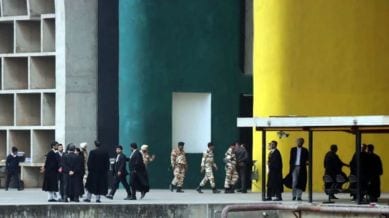Stay updated with the latest - Click here to follow us on Instagram
J&K migrant workers: HC upholds eviction but asks Chandigarh to frame rehab policy
Punjab and Haryana High Court grants time till March 2026 to vacate government quarters, stresses humane approach for long-term residents

The Punjab and Haryana High Court has upheld the eviction of migrant workers from Jammu and Kashmir from government quarters in Sector 29-B, Chandigarh, but granted them time till March 31, 2026, to vacate.
The division bench of Justice Anupinder Singh Grewal and Justice Deepak Manchanda emphasised the need for a humane approach, observing that many of the petitioners had lived there for nearly four decades.
The case traces back to the early 1970s, when workers such as Salinder Kumar and Abdul Samad Mir migrated from the erstwhile state of Jammu and Kashmir to Chandigarh in search of work. In 1983–1984, the J&K administration requested the Chandigarh Administration to provide temporary accommodation for these seasonal migrant labourers during the harsh winters. They were subsequently allotted quarters numbered 1001 to 1060 in Sector 29-B on a temporary basis.
Over time, the arrangement turned contentious. The J&K authorities later sought possession of the quarters, alleging unauthorised occupation. In 2012, the Estate Officer ordered their eviction under the Public Premises (Eviction of Unauthorised Occupants) Act, 1971, which was later upheld by higher authorities and the high court.
Quoting from the earlier judgment, the present bench reiterated: “Merely because the petitioner claims to have been in possession of the property for the last 28 years would not itself clothe him with right, title or interest in the labour quarter, which was meant only as a night shelter and temporary arrangement for migrant labour as licensees.”
The petitioners argued that their long-term residence entitled them to rehabilitation, contending that eviction without alternatives violated their right to livelihood. The respondents, including the Union of India and the Chandigarh Administration, maintained that no policy existed for permanent rehabilitation and that the quarters were never meant for continuous occupation.
While dismissing the pleas against eviction, the court acknowledged the petitioners’ long stay and the potential hardship involved, directing the authorities to explore rehabilitation measures. The ruling, covering multiple connected petitions, also brings attention to broader questions about housing rights and welfare for migrant workers in urban areas.